Jeff Jarvis's Blog
September 22, 2025
The nation is lost

In this terrible time, what disappoints and angers me so about my own field of journalism — to which I have devoted 50 years of my life — is its refusal to recognize fascism, to even use the word so as to explain it, and to judge Trump and the Trumpists for their crimes against decency, democracy, and humanity.
But I realize that by focusing on the failures of journalistic rhetoric I, too, miss the point of the bayonet held against our throats. I complain often about the #BrokenTimes and the very #BrokenPost — about their prevaricating headlines (“magnified questions”) and perverse euphemisms (“exerts control”) and their framing of extremism as one side of bothsidesed “politicization” and polarization. To them, we are perpetually “teetering” near an edge that is ever still ahead, out of sight.
This is so much worse than words. The nation has fallen over that edge. Our country is lost.
The other night, I listened to the latest episode of the Reading Hannah Arendt podcast in which Bard College’s Roger Berkowitz explains War and Revolution. In it, Arendt, as the great historian, philosopher, and educator of totalitarianism, explores violence and crime and “founding a new polity amidst the breakdown of traditions and authority.”
I finally came to the realization that the revolution we are enduring is over. Some ask whether we will enter civil war, but in truth, that war did not end. The South — now merely metaphorical, as its border extends into every state — rose again. It won.
I come to realize that the far-right’s fetishism over the Second Amendment was likely never about rising up in opposition to some feared socialist, gunnapping American regime. It was about recruiting and arming a disordered militia in support of the autocracy of the right — to fight not against government but as internal ally to the Project 2025 vision of the “unitary executive” (read: dictatorship), alongside the Army, National Guard, and ICE-Gestapo, who are given license to evade the rule of law (receipt: January 6) by the Justice Department and Supreme Court, now also under their control. Without the rule of law, the courts, and Congress, there is no check to their power. Then there is no Constitution. There is no democracy.
So we dissent. But where?
Not in media. That, too, is lost. I have lately been shouting fire! about Ellison père et fils, Larry and David, the miniMurdochs, taking control of Paramount and CBS and next Warner Bros. Discovery — and with it CNN. I appeared on CNN to raise that alarm.
Jarvis: I hate to say this to my friends here at CNN, mass media is dying, so they're taking the last of these vestiges of institutions that matter and they're trying to turn them into propaganda organs under threat from the head of the FCC
— Acyn (@acyn.bsky.social) 2025-09-18T02:19:33.269Z
Liberal media? It is time to burn that trope. Yes, there are liberals left in media, but the conglomerating corporations that employ them are either owned by the extremists or running scared from them, acceding to Trump’s every vindictive demand, blackmail, and bribe. Stop calling it MSM (it never was “mainstream” anyway). It is all MAGAmedia now. There’s no comfort to be had in the fact that Trump’s allies are taking control of the empty husk of the former Fourth Estate, for mass media are dead and dying. Propaganda isn’t a business, it’s a weapon.
If not in media, then can we not dissent in social media as our modern, online alternative: the press of the people? No. Twitter is the house organ of the extremists. Zuckerberg and his Facebook, Instagram, and Threads have gone full Quisling. Our one haven for dissent might have been TikTok. But the Ellisons — and now their models, the Murdochs — alongside venomous VC Mark Andreessen are subsuming that, too.
Then perhaps we might find sanctuary in the academy. Cough. The most fundamental tenet and tactic of the fascist revolution has been to destroy education from bottom to top. Over the years, without notice, the right wing took over local school boards (just as they took over local TV and radio stations). Too many universities are proving to be ineffective and irresponsible stewards of enlightenment and academic freedom: surrender monkeys in the face of serious challenge.
God then? Ha! He is their coopted coconspirator in this unholy Crusade, wearing one red hat or another.
/media/bd9d6e0e879b5eaa066db5645eeae183
Cardinal Timothy Dolan on Fox & Friends on Charlie Kirk: "This guy is a modern day St Paul. He was a missionary, he's an evangelist, he's a hero. He's one I think that knows what Jesus meant when he said 'the truth will set you free.'"
— Aaron Rupar (@atrupar.com) 2025-09-19T12:39:15.101Z
Then to the ballot box! Well, sure, but as the extremists lie and cry that elections are rigged, they’re projecting while gerrymandering and ending voting rights and exploiting the advantages given their slave-holding forebears in the Senate and Electoral College.
In The Guardian, Timothy Garton Ash warned that Americans have but 400 days and counting (394 as I write this) to perhaps save a last shred of hope by winning back the House. But our putative Democratic leadership can’t summon the spine to endorse the most exciting leader we have seen in a generation in New York, too busy as they are crawling out from under the used campaign bus they keep driving over each other.
So then let us take to the streets! OK. But see where I began: They are in power. We are not. They are organized. We are not. They are masked. We are not. They are armed. We are not.
At the end of a despairing post such as this, you’d expect me to offer my solution, saving the nation if only we would…. But I cannot. This is my worse fear: I do not know where this ends. I look often to German history and to Arendt’s lessons from it. The nation that gave rise to the most odious regime in modern memory was able to rebuild only from the ashes of its complete destruction. What might it take to cauterize the wounds to our democracy?
People like me — old, white men, going back generations — did not exercise our privilege to win the fight for all of us. Justice teetered and we sat silent, complacent for too long. Now we are silenced.
Oh, I will still speak up. I will dissent here. I will vote. I will march. But to what end when so much is lost? Is there any way that we, the democratic majority, can claw our way back to save any vestige of democracy? I do not know.
I have vented my fears, frustrations, and fatalism these last days on podcasts, which is what they apparently exist — here with friend Pete Dominick, here with Daniel Fürg, and below on American Friction. These conversations inspired this mood and post.
After writing this, I read a column by my former CUNY colleague, M. Gessen, about the recognition that one’s country is lost. They have experienced this loss twice.
The post The nation is lost appeared first on BuzzMachine.
August 12, 2025
Len Tow
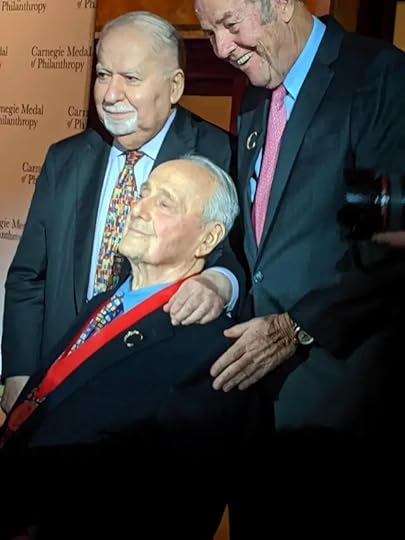
We have lost a most generous soul. I have lost a benefactor, mentor, and friend. Leonard Tow died Sunday at age 97.
Len held a PhD in economic geography from Columbia and taught at Hunter and Columbia before deciding to leave for business, first in theater and then in the infant industries of cable TV and mobile telephony, where he founded and built the nation’s fifth largest cable company. There he lead in technological innovation as he fought to defend freedom of expression in the new medium. That was enough accomplishment for a life. But in 1988, he and his beloved wife Claire created the Tow Foundation. In 2012, they signed the Giving Pledge. They supported so much important work in medicine, the arts, higher education, civic engagement, juvenile justice, and innovation. Please read the family’s and foundation’s celebration of his amazing life here.
I came to meet Len almost twenty years ago, when he became concerned about the state of journalism in democracy. Len was a major backer of Brooklyn College at the City University of New York— his alma mater — and he told CUNY’s then-chancellor, Matt Goldstein, that he was planning to give money to Columbia Journalism School to nudge them into updating their curriculum. Hold on, said Goldstein: CUNY is starting a journalism school.
And so Len came to meet with the founding dean, Steve Shepherd, and me, and we told him about our plans to build a new school around the innovation that was — and still is — so desperately needed in the field. Len held a competition between us and Columbia. Well, put air quotes around “competition.” We both won. Len gave each of us each matching grants, ours for $3 million to start a new center for innovation.
Steve and I didn’t know what the hell we were doing in fundraising. Thank goodness, Len’s daughter, Emily, who leads the foundation, took us under her wing and schooled us in how to support our work. We missed the match deadline, but the Tows lent us slack. The Knight Foundation met Tow’s challenge and the Tow-Knight Center for Entrepreneurial Journalism began. I was its director. Columbia opened the Tow Center for Digital Journalism, recruiting friend Emily Bell, who did indeed bring its curriculum into the future.
Thus began a wonderful relationship with Len and the foundation. He and Emily have been magnificent funders — never interfering, always ready to give advice when asked, eager to make useful connections, encouraging of every success, patient with lessons learned. I was fortunate to visit Len occasionally, and we could talk for hours. I would learn about his pioneering in media technologies and he would quiz me about innovations in the internet and artificial intelligence. I asked him for his wise advice on the next steps in my career. Whenever I tried to thank him for his support, he’d pshaw me away.
Len had a wonderful habit of coming up with his own ideas for supporting us. After Steve Shepherd retired and Sarah Bartlett became dean, I saw Len at one of the fundraising galas we held then, featuring the inspiring work of our graduates. Len pulled me over and said he’d just decided to create a scholarship in investigative journalism named for Steve. He also funded annual faculty awards.
One day, Len surprised me with the news that he was endowing the Leonard Tow Chair in Journalism Innovation, and I had the immense privilege of filling it.
There are countless stories like mine of Len encouraging and supporting work: doctors researching cures to devastating diseases, playwrights developing their talents, professors building curricula, young people making new lives for themselves.
I am so grateful to have known and learned from Len. My heart goes out to Len’s and Claire’s children, Andrew, Emily, and Frank, and their grandchildren. I am grateful to the family for their continuing work in the Tow Foundation and for generously sharing Len with so many of us.
The post Len Tow appeared first on BuzzMachine.
July 18, 2025
Whither Colbert? Whither democracy

Like every sane American, I am outraged that CBS/Paramount/Ellison Inc. canceled — in the true meaning of the word — Stephen Colbert, capitulating to Trump in the rapid Orbanization of American media.
Here I propose what I hope comes next for Colbert: that he build his own show and empire online. And I’ll tell for the first time of my foiled attempt, back in the day, to broker a deal for Howard Stern TV on the internet.
But first, allow me to briefly address the state of mass media.
Mass media are dead. Larry Ellison et fils merely threw another shovelful of dirt on the coffin. Most newspaper chains are owned by hedge funds, cut to the stump and useless. Magazines are in hospice (I chronicle their fall in my book Magazine, now an audiobook!). Our national news, The Times and The Post — are irreparably broken. Terrestrial radio is the tower that falls in the forest, which nobody hears. Broadcast TV is the cultural Kmart. Cable has cooties. Streaming is sinking. Hollywood has no imagination. Books are suffering.
Trump is commandeering mass media because he thinks scale still makes stars and wields power. Joke’s on him: He’ll end up controlling a crumbling, cowardly relic of an age that opened in 1893, when magazine publisher Frank Munsey invented the attention economy, and began to close in 1993, with Mosaic and the link, which allow us all to become publishers. The masses don’t need media anymore. The masses are media.
The question is whether we — the people formerly seen as masses — can protect our voices and our independence from fascist authoritarians and craven capitalists. Colbert could lead the way by making his own, independent media.
This leads me to the story of Howard Stern and the internet. I think enough time has passed that I may recount it. One day in 2010, I got a call from Howard’s beloved and fabled agent, the late Don Buchwald. In 2006, Howard had left the censorious airwaves of terrestrial radio for Sirius’ satellites. His first contract coming due, Buchwald the master negotiator was looking for options and likely leverage.
I had written then about my hope that Howard would become monarch of the web. When Howard answered my calls on-air, I tried to convince him that he could be the king of all podcasters. “I hate podcasts,” he said. “A jerk-off sitting in his living room talking for hours. If I wanted that, I’d get married.” He mocked me for podcasting. Fine. He also mocked Joe Rogan for podcasting. Ah, well. (And he’s happily married.)
Buchwald, no doubt echoing Howard, had concerns about infrastructure if they tried to go it alone: making and serving so much video before ubiquitous broadband; selling subscriptions and ads. He wondered instead about YouTube and asked whether I could make connection. I emailed Eric Schmidt about Howard:
Just as he made satellite work as a business, I believe he could make the internet work as an entertainment medium at scale, with payment. I have no doubt that he’d bring some millions of paying fans with him and could make the business work at a very reasonable price point. And I think this could be wonderfully disruptive to the incumbent entertainment industry.
Schmidt replied, “obviously Howard would be a good partner for us if we can find a business structure that works.” He connected me with Robert Kyncl, who’d just arrived at YouTube from Netflix to head up TV and film relationships. I relayed my conversation to Buchwald:
He’s quite enthused about this and grateful that you’re coming to them. It’s “right up our alley,” he said, and they have “utmost interest.” They are looking at building subscription businesses around personalities so this is a great first move. He sees big potential for global subscription; what interests him is the ability to go global without the border restrictions other entertainment properties bring. He also respects the value of Howard; when he was at Netflix, he told me he’d lusted after Howard TV. Finally, he asked whether this would be a JV and I said I had nothing whatsoever to do with that; my involvement was strictly in making the connection and nothing more. But don’t you love it when they start negotiating already?
Four months later, Buchwald emailed me with an update, reporting that Kyncl “was unable to keep several appointments (mainly phone). So I finally gave up.” Show biz. Howard signed a next contract and a next and next with Sirius.
The lessons here: I still wish Howard had come online. But it’s just as well he didn’t do a big, exclusive deal with YouTube. This is why I would like to see Colbert come to the internet, not in some exclusive deal with YouTube or, please no, Substack. He can make his own home online, and from there post and stream on YouTube, TikTok, Facebook, everywhere — exploiting others’ audiences while maintaining his independence.
As I lamented Colbert’s cancellation on the socials, some folks wondered whether he could go to Comedy Central. Sorry, I informed them, but guess who’s going to own it, too: Ellison the Trumpist. I worry, then, about Jon Stewart and the crew at The Daily Show at Comedy Central. I fret, too, about Jimmy Kimmel at blackmailed ABC/Disney.
Therein lies the key lesson, especially in this day: Stay away from any entity that could be pressured by and become beholden to the fascists in power. Trump even wants to censor “woke AI” (thus I will argue that if companies are people then AI has First Amendment rights — but I digress).
Buchwald was not wrong 15 years ago to worry about the complexity of starting an online media empire. But in the meantime, all necessary roads have been paved.
We on the left have long wished for our version of Rogan — not our ignorant, testosteroned asshole, but our popular, intelligent, and informed maypole of enlightenment to gather ’round in defense of democracy and decency. I wish that to be Colbert — and Kimmel and Stewart and Stern, plus Joy Ann Reid, Katie Phang, and other refugees from corporate, thus Republican media. I wish that to be on an open and free internet, where they can’t be bought and sold and silenced, and public discourse has its rightful proprietor: us, the public.
The post Whither Colbert? Whither democracy appeared first on BuzzMachine.
July 4, 2025
The Times’ Mamdani vendetta
The Times has it out for Zohran Mamdani. The record is clear. It is time to examine receipts.
The latest attack on him is journalistically unconscionable, and so is the editors’ reaction to legitimate criticism. In a story played by its editors on its home page and boosted by its reporter as his scoop — when it was obviously planted by the right-wing based on the theft of documents from Columbia — The Times said teenaged Mamdani ticked boxes for Asian and Black or African-American on his application, implying he was trying to cheat — to DEI — his way in.
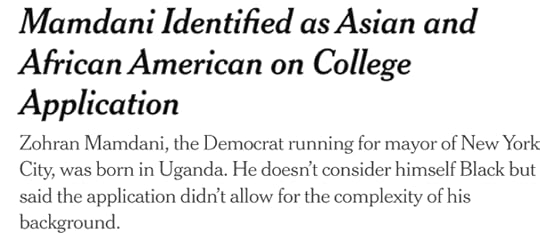
Never mind that Mamdani was born in Africa, that his father was on the university’s faculty and so his origins were clear, that he was 18 years old, that he was not admitted, and that, as Professor Siva Vaidhyanathan puts it,
Many people from Africa come to the US, find themselves baffled by our “racial” check-boxes, and just wing it. Many Eritreans, Malians, Egyptians, Moroccans, Algerians, Malagaseys, and South Africans don’t identify as “Black” regardless of skin color. But they are African. We make people make dumb choices.
I would say The Times was used, but that would imply that it did not willingly and wittingly make itself an accessory to the smear.
Jamelle Bouie, just about The Times last saving grace, criticized the story, suggesting on the socials that journalists should inform readers when their anonymous source is a Nazi. He obviously was chastised by editors, for he soon deleted what he dared say.
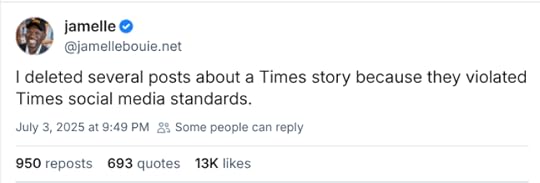
That Times policy is itself a journalistic travesty, for it decrees that no one is above criticism from The Times, but The Times is above criticism even from within.
Of course, this comes after The Times’ anti-endorsement of Mandani. After The (former New York) Times said it would no longer endorse candidates in local elections, it was stuck, wanting to throw its weight after sexual harasser Andrew Cuomo against the Muslim socialist. It couldn’t endorse Cuomo but said many New Yorkers would be voting for him because of his strong policy record and many endorsements: the non-endorsement-endorsement.
The Editorial Board’s policy of no longer telling New Yorkers whom to vote for did not stop The Times from telling them whom to vote against. “We do not believe that Mr. Mamdani deserves a spot on New Yorkers’ ballots.”
The Times’ hostility to Mamdani is not limited to its editorial page, nor is it consistent. Some of its columnists have written positively about him and there has been some favorable coverage. The Times has also covered the right’s odious attacks on him and his faith and background. But much has been shameful….
Upon his phenomenal victory in the primary, The Times first sought out everyone it could find who opposes him, as if any Democrat, any New Yorker, anyone should give a good fuck what Trumpist Bill Ackman thinks.

The Times wishes to stir fear and division. Business leaders “fear Mamdani.”
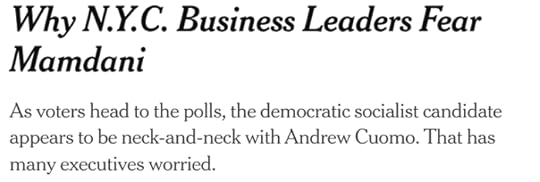
The Times speaks with real estate executives as well as campaigners for tenants’ rights, but the headline says only that Mamdani “strikes fear in the real estate industry.” The piece does not point to The Times’ own interview in which the candidate said he has learned the importance of private-sector development in solving New York’s housing crisis. He advocates zoning more housing around public transit and reducing requirements such as parking. But fear makes for better headlines, as apparently does emphasizing the concerns of the rich. I’d like to read a report about what tenants themselves have to say.

Out of a fairly wide-ranging Meet the Press interview, what did the newspaper of the rich — I mean of record — choose to report on in its headline?
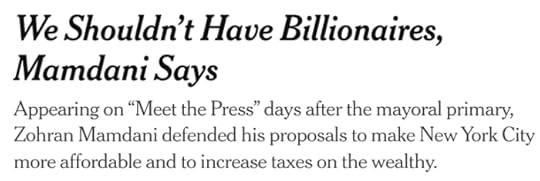
The Times felt compelled to add: “Mr. Mamdani, a democratic socialist, asserted that he is not a communist.” Somebody alert HUAC.
The Times chooses to focus on “a fractured Democratic Party.” Sure, there are fractures; there always are in democracies, for that is the point of them. The Times could have instead focused on the remarkable unity shown between a Democratic Muslim, Mondani, and a Democratic Jew, Brad Lander, that made this victory possible. But unity doesn’t sell newspapers.
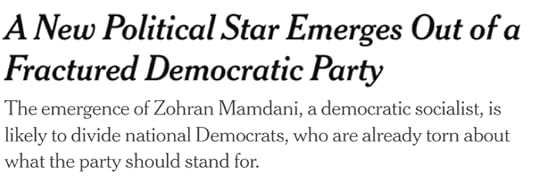
Similarly, The Times says Mamdani’s victory “spotlights a deepening rupture among U.S. Jews.” More likely, it spotlights The Times’ inability or unwillingness to cover that rupture over Netanyahu’s wars. But that’s another story.

Odd that The Times characterizes a campaign by a Muslim candidate for public office as “delicate.” Imagine if The Times said running as a Jewish candidate or a Black candidate or a woman candidate were “delicate.” (But then, in the day, it probably did.)
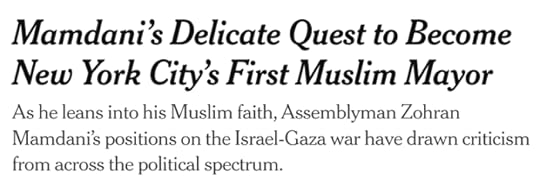
The list-addicted Times tells us that these are the five things voters should know about Mamdani as presumptive nominee. The first is that he has a short track record; the second, his views on a controversial issue far from New York — Israel and Gaza; the third, he’s Muslim; the fourth, he is the supposed creation of that odd thing The Times still cannot grok, social media.
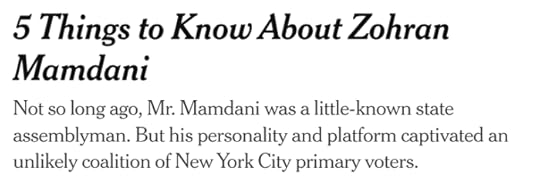
The old farts’ daily still thinks social media is a new and puzzling thing…
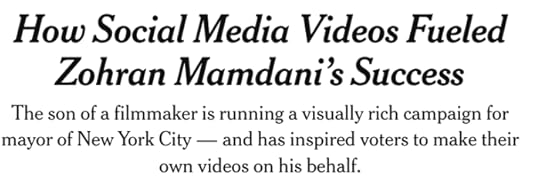
Only at the end, at the fifth of the five things New Yorkers should know about the leading candidate to be their mayor, is there mention of his “pithy policy solutions” — cheaper food, free buses, free child care.
The Times dismisses what Mamdani stands for and what brought out voters (from the “Commie Corridor”) in his favor as simplistic and unrealistic.
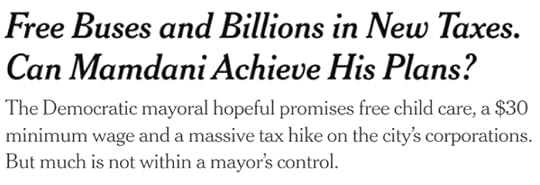
The Times asks — just asks — whether when these simplistic, unrealistic, foolish, Democratic New Yorkers — the people formerly known as Times readers until The Times pissed them all off — are shooting themselves on Fifth Avenue.

Looks to me like The Times is itching to give its non-endorsement-endorsement next to the worst mayor among so many awful mayors, quoting “business leaders” praising Adams for going on Fox and Friends to attack Mamdani.
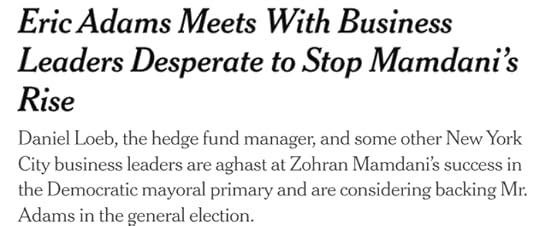
In the end, The Times is simply confused, making another pathetic listicle seeking ways of making sense of Mamdani’s victory.
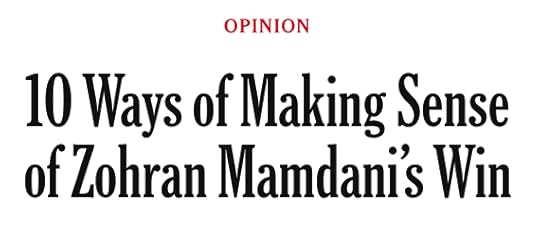
I would suggest that The Times look in the mirror, but that would violate its policy, for those inside who try to do that are reprimanded and forced to delete their legitimate criticism.
Truth is, more than anything, Mamdani reveals just how out of touch The New York Times is with its city, with youth, with women, with Democrats and progressives, with under-represented communities, with the working class and poor, with tenants, with bus-riders, with people who buy their own groceries, with dogs, with the anti-Trump resistance … with the future.
But he wears nice suits.
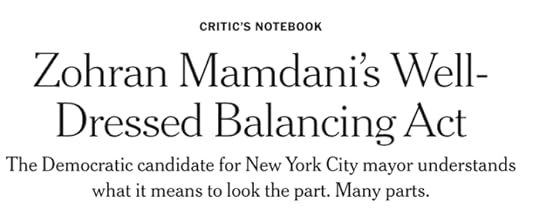
The post The Times’ Mamdani vendetta appeared first on BuzzMachine.
February 6, 2025
Here we go again

In an endless game of lobbyists’ Whac-A-Mole, it’s a new year and here is new legislation trying to save the news. Except it’s not new.
First, from Oregon, comes a rehash of bad legislation written by newspaper hedge-fund lobbyists, versions of which were deflected in two other states last year. At least the Beaver State tries to add a new bit inspired by good legislation in New Jersey, but even that ends up somewhat mangled.
Next is New York. Last year, the governor signed the single worst piece of protectionist legislation to date, giving tax credits to print and broadcast news but not digital or not-for-profit news. How 1973 of the Empire State. Now a state senator has Xeroxed the same awful lobbyist’s legislation from other states and thrown it into the Albany sausage extruder.
And my Garden State is not off the hook, for though it boasts a model for other states to learn from, it also offers a silly new bill about AI and the news.
The Oregon bill, SB686, is two bills in one. The first half is a messy version of the California Journalism Preservation Act (CJPA), which I studied and testified against at the time. CJPA was superseded by Google’s deal with the state to help fund news with public and private funds.
CJPA was a near-carbon-copy of a bill that has so far been defeated in Illinois (which I also testified against), which in turn was a rendition of the federal Journalism Competition and Preservation Act (JCPA), which mercifully has gone nowhere in Congress. All these bills come initially from the pen of the News Media Alliance (NMA), the lobbyist that represents the interests of the hedge funds and billionaires who own and ruin American newspapers. The NMA is the rebranded merger of dying-industry trade associations, the 138-year-old American Newspaper Publishers Association and the 106-year-old Magazine Publishers Association.
In the first half of Oregon’s bill, it mandates a fee from only the largest internet platforms (companies with $550 billion market cap or 1 billion monthly users — i.e., Google and Meta). It requires them to pay news sites an unspecified amount for merely “accessing” their content. It is, in short, a tax on reading.
In the second half of the bill — and this is a new twist — Oregon offers platforms the choice to instead contribute a still-unspecified amount to a newly formed Oregon Civic Information Consortium. That sounds an awful lot like the New Jersey Civic Information Consortium, which has been doing excellent work — but, as I will shortly show, they are not alike.
A major problem with these bills, as I’ve testified over and over, is that they do not account for the value internet companies bring to news companies. Platforms “access” publishers’ content to benefit publishers; they “access” news to link to and bring audience to it. But Oregon’s bill specifically prohibits “any value conferred upon any digital journalism provider” — other than cash — from being reckoned in any negotiation mandated by the bill.
As I outline in my paper, we know well from Canada’s experience with its awful Online News Act that once Meta refused to negotiate and decided to take down headlines from its platforms, Facebook and Instagram suffered no loss of traffic (as verified by independent studies), while news providers lost up to half their traffic. That is to say, the headlines proved to have little to no value to the platforms, but the platforms’ links had incalculable value to news sites, now lost. Yet in Oregon, that is not to be discussed.
As with prior bad bills, Oregon’s requires that to get paid, a news site must already earn at least $100,000 in revenue or be a 501(c)(3), which leaves out a vast swath of small, new, community news outlets. This legislation, remember, is written by newspaper lobbyists to benefit newspaper owners, not new competitors. In a sop to the small guys, a big 1 percent of the money in Oregon’s bill would be paid to little guys earning less than $25,000 a year and the other 99 percent would be split among the big guys proportionate to their staffing.
Depending on their size, news providers are required to spend 50 or 70 percent of the money they receive under the bill on news and support staff. The rest, I guess, is funny money. But in fact, it’s all funny funds since money is fungible and there is no requirement that these resources will go to growing journalistic coverage in the state. The money will go straight to the owners’ bottom lines, thence in fees to the lobbyists who earned it.
As in the bills that Oregon copies, there is a nonretaliation clause, which forbids platforms from “refusing to access content” or affecting its display. I will say again and again that compelled speech is not free speech. Canada could not require Meta to carry news because its human rights law would not allow it. (But we know these days that we are not nearly so enlightened as Canada.)
Oregon’s legislators kick the can on details — starting with how much money is being demanded — by requiring complex arbitration, claims administration, and auditing processes. I will spare you the details.
The other half of the bill is devoted to establishing an Oregon Civic Information Consortium to which platforms may contribute instead. Its purpose is to “advance research and innovation in the field of media and technology to benefit this state’s civic life and evolving information needs.” It requires news sites to work with universities on projects.
Here Oregon borrows the name of the New Jersey Civic Information Consortium — and its published goals — while missing the real benefits of what I call the New Jersey Model. Oregon avoids creating a new tax with the prickly political implications that comes with taxes by instead mandating a fee for “accessing content” to be paid directly by the platforms. New Jersey, in contrast, devotes public funds to the public good of journalism. New Jersey’s Consortium then raises additional private funds to support news. New Jersey’s Consortium gives grants directly to news enterprises that meet various goals. Oregon’s bill instead funnels the money through state universities — losing money and time to overhead fees and bureaucracy while also requiring the universities to match funds (not easy for any university to do in these hard times).
The New Jersey Model has another critical leg to the stool that is missing in Oregon. The NJ Consortium, its grantees, and all the state’s news ecosystem are supported by Montclair State University’s Center for Cooperative Media (where — full disclosure — I am a fellow) and its NJ News Commons (which I had a hand in founding a dozen years ago), which together provide training, mentorship, and coordination for collaboration.
About now is when I always issue my standing caveat: I get hives at the prospect of government involvement in and funding of speech, particularly journalism — witness what is happening now with the right-wing Congress attacking (again) NPR and PBS; Trump the sovereign’s new wealth fund to buy TikTok; and cases before the Supreme Court from Texas and Florida trying to compel platforms to cover noxious, right-wing speech. Danger lurks there.
But once the decision is made by state or local government to financially support local news, the New Jersey Model is the best framework for doing so that I have seen. Money does not go to feed hedge funds and their lobbyists’ but instead supports news organizations directly, based on the Consortium’s published goals. Anyone can apply. Grants are awarded based on the merit of those proposals. Follow-on grants assure accountability. And the Center for Cooperative Media is there to help grantees — and all its 400-plus members — succeed. The Consortium is governed by a 16-member board made up of representatives from the state universities and appointments made by the governor’s office and legislature and the board itself. Thus far, New Jersey’s Consortium has made $9 million in grants to almost 60 applicants.
The Consortium is admirably transparent, releasing regular reports. And as I write this, it just published a case study it commissioned. I urge lawmakers thinking of writing legislation to benefit news to read the case study to see how it might be done. Indeed, as California is determining how to implement its deal with Google — and, it is hoped, more tech companies to come — I have argued that New Jersey presents a model for how to structure and operate such an effort. Without such an infrastructure, tax money or money demanded from tech companies could be wasted.
I have no personal dog in this hunt other than trying to see news ecosystems grow, rather than just handing over money to the hedge funds and billionaires who are primarily responsible for the fall of local news in America.
I also want to avoid further awful outcomes of bad legislation. I don’t want to see what happened in Canada happen here: I fear Meta could use this as an excuse to drop all news in the United States. And Google has made clear — as was also the case in Canada — that if legislation is enacted forcing it to pay for news, it will end its voluntary programs: the Google News Initiative and Google News Showcase, which provide much support to innovation and growth in news. Google (and Microsoft) are just about journalism’s last friendly benefactors in the tech industry. Why not first discuss public-private collaboration before unilaterally seeking retribution on them?
I hope that Oregon’s legislators will study both the NJ Civic Info Consortium case study and my paper about the California legislation and then I’m happy to discuss alternatives and connect them with the people doing this good work.
Now to New York. New York’s new bill, SB4401, is nothing more than a recycled copy of the News Media Alliance’s legislation.
The New York bill demands that platforms — defined as in Oregon (i.e., Google and Meta) — submit to arbitration to set an unspecified percentage of ad revenue that must be paid to news sites as a “journalism usage fee” — never mind that the platforms are promoting and linking to, not using up the news. The bill, like the others, forbids any consideration of the value platforms bring to news sites by linking to them and sending them audience, and also forbids platforms from not carrying and promoting their news. New sites are defined as any site that “has at least twenty-five percent of its editorial content consisting of information about topics of current local, national, or international public interest.” Note the “or” — the site doesn’t even have to be local.
Various organizations with savior complexes for news think that passing any legislation to support any part of the news industry is a good. No. What should be supported is growth in local news ecosystems, concentrating first on communities too long not represented in or served by incumbent, institutional, “mainstream” (read: white) mass media. If you want to support old media, support Black and Latino media that have been serving their communities for generations with no public support. If you want to build the future, support innovation among young journalists and community organizations that have trust in those communities.
Says the New Jersey Consortium’s case study: “New Jersey is the first state to use state-appropriated funds to address the local news crisis and the rise of news deserts and misinformation by supporting news startup, early-stage, and more established products/outlets that seek to rebuild the community information network and grow the local news ecosystem.”
Growth is the goal, not short-term salve to failing legacy businesses. Do not just hand money over to the open palms of dying newspapers and pablum broadcasters and their national corporations. I keep telling politicians that they need not fear and cater to these old media outlets, which no longer buy their ink by the barrel. They now buy it by the thimbleful.
And there’s one more bad bill to discuss: New Jersey’s AB5164, which would “regulate artificial intelligence in [the] news media industry.”
After repeating the trope that for an AI company to read content is theft (doing what journalists do every day when they read, learn from, are inspired by, and use information from each others’ work), this bill says it seeks to “regulate artificial intelligence, particularly in the news industry, in order to protect journalistic integrity and the responsible dissemination of news.”
How? It would establish the Artificial Intelligence in Communications Oversight Committee — just what the world is crying for, another AI committee. I’m not sure why they focus only on AI’s impact on news. The bill would prohibit “using artificial intelligence in lieu of professionals and staff.” But if this struggling industry can save precious resources by using technology to bring efficiency to mundane tasks — as it did with typesetting and presses in days of yore — why should it be forbidden from exploring that possibility today? The bill would require prominent labeling “that the content is generative AI” (does that include transcription, translation, and spell-check?), and a disclaimer that such content may not accurately reflect the source. It would require “credit to any source used to produce the content” (if only journalists were required to faithfully do that).
With all the problems in news and our world today, this isn’t one of them.
To learn more about news legislation across the world, see this legislative update produced by Montclair State’s Center for Cooperative Media, which I hosted two months ago:
The post Here we go again appeared first on BuzzMachine.
January 21, 2025
The whole world is whining

For 25 years now, the Edelman PR company has issued its Trust Barometer. This year, it’s all about grievances. It’s Festivus every day, the world around.
Six in 10 people in the survey “hold grievances against business, government, and the rich.” Only 36% worldwide — 30% in the US, 14% in Germany, 17% in the UK — believe the next generation will be better off than today.
A majority of people surveyed are frightened of losing their jobs — which, upon reflection, boggles sense, for that would imply that half the world’s jobs are in imminent jeopardy. Unless you believe the fantastical ravings of the most hubristic AI boys, that’s simply illogical. This leads me to think this pall on the world might be more about perception than reality.

Where does that perception come from? In this chicken-and-rotten-egg cycle, I wonder whether the complaints came first or whether the political and media exploitation of fear and worry are what fabricated the evident dark vibe. This survey of 33,000 people in 28 countries will not answer that question. But it does paint an enlightening picture of the world’s dark mood. And it almost doesn’t matter whether perception or reality lead, for the survey presents a picture of a world ready to blow — on its own or under the encouragement of both extremist movements and media looking to stir things up for attention.
So here’s the really chilling bit: A majority — 53% — of young adults aged 18 to 34 “see hostile activism as a viable means to drive change.” The percentages are lessened for older people, averaging 40% overall. This is how many respondents approve of “hostile action” to “engage in online personal attacks against individuals who you see as standing in the way of the change you want to see” (27%), to “create or share exaggerated or even false online content to influence public opinion” (25%), to “threaten or engage in physical violence against the institutions or groups that you see as standing in the way of change you want to see” (23%) [my emphasis], or to “damage or destroy public and/or private property to bring attention to the change you want to see” (23%). This on the day that America’s old and new president pardons and releases 1,500 angry, violent insurgents from prison. Hostile activism is in charge.
As we know, it’s not just younger people but poorer people who are angry. Edelman’s trust index — an averaging of attitudes toward business, government, NGOs, and media — is 61% for the top quarter of earners but 48% for the bottom quarter, a gap of 13 points. Trust in employers “to do the right thing” fell three points in a year to 75% (surprisingly high). But among those with a high sense of grievance only 30% of people trust CEOs. Overall, two-thirds of people believe the wealthy don’t pay their fair share of taxes and their “selfishness causes many of our problems.” Yet in America, the oligarchs are now fully in charge — and it’s these voters who put them there.
At moments such as this, I always feel compelled to point to the lessons Hannah Arendt teaches us. This from The Gutenberg Parenthesis:
“Arendt found in Nazi and Soviet history “such unexpected and unpredicted phenomena as the radical loss of self-interest, the cynical or bored indifference in the face of death or other personal catastrophes, the passionate inclination toward the most abstract notions as guides for life, and the general contempt for even the most obvious rules of common sense.” … Arendt was careful to observe that it wasn’t just the “masses” who followed Hitler and Stalin but also elites — as with present-day senators, judges, and business titans — who “did not object at all to paying a price, the destruction of civilization, for the fun of seeing how those who had been excluded unjustly in the past forced their way into it.” Both sectors of society did not so much belong to a movement as they had nothing else to belong to, so they could devote all their loyalties to the leader.”
It is disturbing that a worldwide average of 63% of people “worry about experiencing prejudice, discrimination, or racism.” But here’s the revealing piece about America under Trump: 40% of whites say they worry about experiencing racism.

Illustrative of that widespread mistrust, more than half of people with high grievance also have a zero-sum mindset — i.e., “What helps people who don’t share my politics comes at a cost to me.” This what is instilled in the right wing. And it has taken hold.
I can hear the journalists puffing up their chests, ready to volunteer that this is why journalism is needed. Not so fast, Clark Kent. Well more than half of people — up to three-quarters of those with high grievance — say that news organizations “would rather attract a big audience than tell people what they need to know.” Thus the attention economy invented by mass media and imported online to corrupt the internet has come home to roost in our distrustful society.
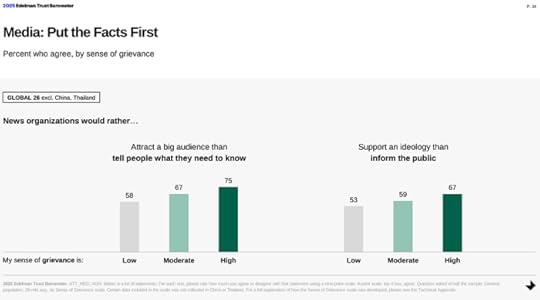
It gets worse. Seventy percent of people believe that journalists and reporters “purposely mislead people by saying things they know are false or gross exaggerations’ — that is, lie — just beating out government and business leaders.

This is to say that no one believes anyone.
And before the tech bros think they have the solution, you can step back from your chatbots. Only a third of people with high grievance trust AI.

On the other hand, at least Google is compartively well-trusted.
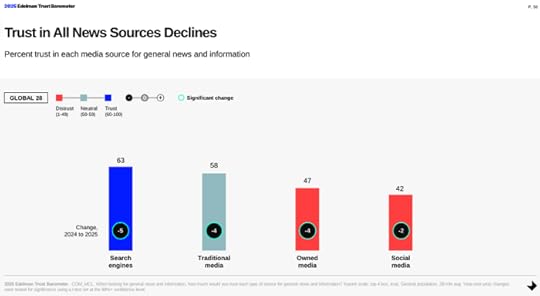
As for the rest of us, I have but one bit of hopeful news to offer: Scientists and teachers are (still) trusted. But the right-wing is working hard to undercut them, too.
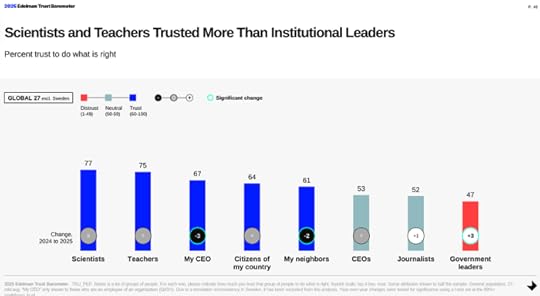
What is to be done? Edelman has various prescriptions. I focus on one. More than two thirds of people across the grievance spectrum say “you will earn legitimate influence with me if you understand what people like me need and want.” Listen.
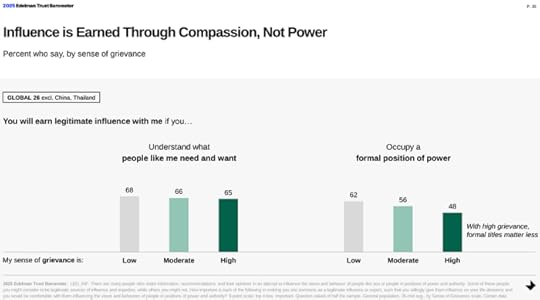
The post The whole world is whining appeared first on BuzzMachine.
January 18, 2025
How the #BrokenTimes covers the fascist oligarchy
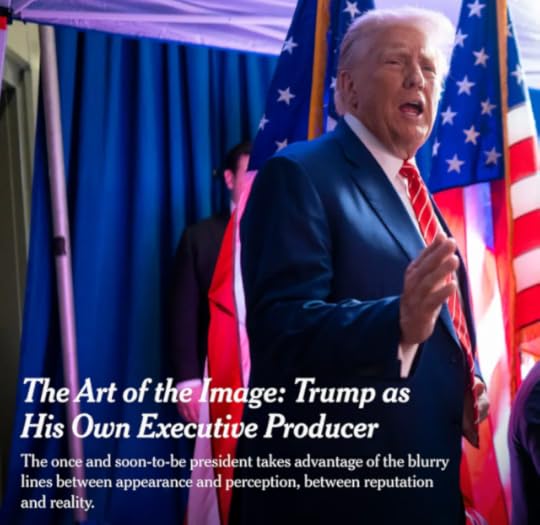
Two days to go until the fascist oligarchy comes to power in the United States and this is how our once-greatest newspaper, The New York Times, is covering what could end in the fall of American democracy. To The Times, all the world’s Trump’s stage and they’re merely spectators.
On the socials, I started to criticize today’s coverage, with a stack of lead #BrokenTimes slugs to insert with each complaint. But I was overwhelmed by the cascade of disappointments in this urgent moment — and by my exhaustion at the futility of hoping The Times could be better. That is why I criticize it: in that hope.
Start above. Yes, that story about Trump as impresario examines how he turns his crimes and lies to his favor with his gullible public. The Times wonders at his magic:

But the “gray areas between appearance and perception” is precisely where journalism is needed. Can they not understand that his success is their failure? Where is the self-reflection on their own willful credulity as well as their judgment of the public’s epidemic ignorance? The Times already surrenders to the idea that his second term is “his story” to tell when it should be theirs — or actually the country’s and posterity’s.
And how are we, the people, permitted to tell it? Through polls, damned polls.

I constantly criticize the use of opinion polls, always quoting the late James Carey of Columbia, who taught that polling preempts the public discourse it is intended to measure. In my book, The Gutenberg Parenthesis, I write:
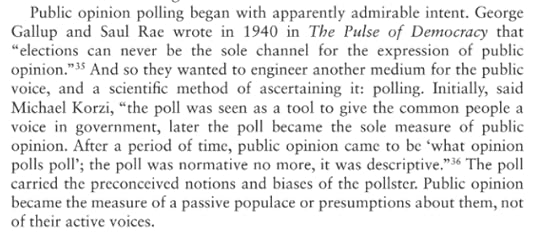
The Times poll provides damnable evidence of the fallibility of the form when set against a Wall Street Journal poll this same day. According to The Times’ rendering of public opinion, America is all in on MAGA fascism, itching for mass deportations to start.
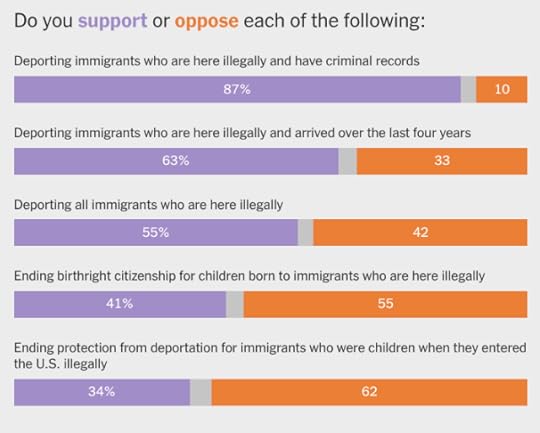
Yet look at The Journal’s poll:

“MAGA Lite,” as in, ‘We voted for Adolf but can we have the Duce now?’ According to The Journal, 70% of Americans “would protect longtime residents from removal if they don’t have criminal records” and thus do not favor mass deportation. Majorities of respondents also oppose pardoning January 6 rioters, oppose taking Greenland or the Panama Canal by force, oppose making Canada the next state, oppose Musk and his “doge,” oppose ending birthright citizenship, oppose cutting education and health care, and recognize that tariffs will raise prices.
So which is it: Mondo MAGA or MAGA Mini? Neither. Each is an impossibly flawed portrait of the nation’s nuanced thinking. Realizing that, The Times resorts to its favorite haunt: the proverbial diner.
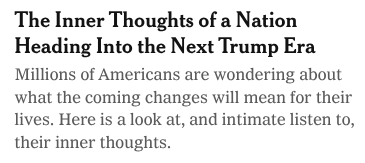
What hubris it is for the paper to think it can, with random quotes selected by its editors, portray “the inner thoughts of a nation.” Then again, when the inner thoughts The Times chooses to present on its home page are such as this, it is more likely just another opportunity to dismiss the views of the nation:
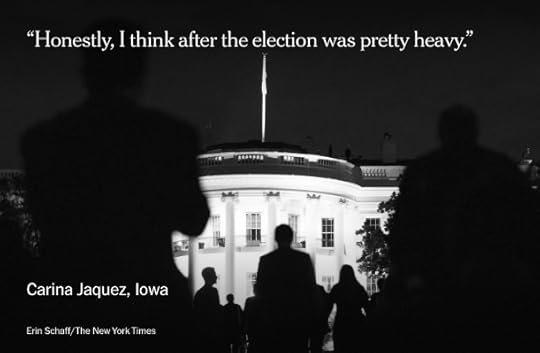
Mind-reading the inner thoughts of the populace is not much more hubristic than journalists thinking they write “the first draft of history” while too often dismissing history’s lessons.
I was most appalled to see how The Times presented the right’s threat to birthright citizenship as merely an “idea” that Trump “wants to redefine.” No! To end birthright citizenship is to end Reconstruction and grant victory to the Confederacy. It is a shocking and abhorrent racist and xenophobic plan that should have journalists shouting warning.

The Times responds not with appropriate historical perspective but instead with the anodyne calm of present-tense journalism: “If Trump follows through on this promise, it would represent a triumph for a certain vision of America.” Of course, The Times does acknowledge that this is a question of equity (read: race). But it ends up bothsidesing the Civil War. “The battle over birthright citizenship will be a fight between these two nationalisms.” This from the newspaper — from its magazine — that gave us the 1619 Project. God help us.
I have been trying to write an essay about what I see as a current crisis of judgment. Journalism is afraid of judging our politicians and even their most noxious policies, not daring to condemn a challenge to the most fundamental pillar of Reconstruction. News organizations are afraid of judging the electorate for their ignorant ideas and perilous, self-destructive choices. Meanwhile, technology companies are ever-more refusing to judge extremist, manipulative speech, both because it’s expensive and because that is the speech of the regime now in power.
But journalists are happy to judge one category of the country and blame them for where we are: the left. The Times invites no one less than “two of the world’s leading thinkers,” Thomas Piketty and Harvard’s Michael Sandel, to examine how “the left went astray.” It is the right that has given us the fascist oligarchy but it’s the left that went astray.
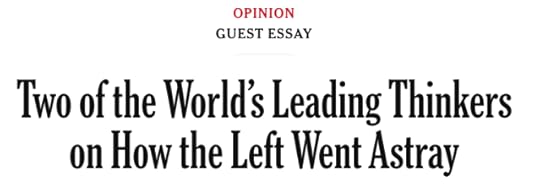
The Times does that one worse: It invites one of the world’s most noxious thinkers, the philosopher-mascot behind the worst of Silicon Valley’s oligarchs — Thiel, Andreessen, Vance — to spew his extreme ideas. It even grants him the prominence of one of its creepy Harry Potter Daily Prophet animated portraits on the home page, Curtis Yarvin drumming his fingers at our doom. Says The Times‘ David Marchese: “Until recently, those ideas felt fringe.” Ideas such as replacing democracy with a dictator-CEO. “But given that they are now finding an audience with some of the most powerful people in the country, Yarvin can’t be so easily dismissed anymore.” So let’s amplify his ideas further. They’re only ideas, after all.
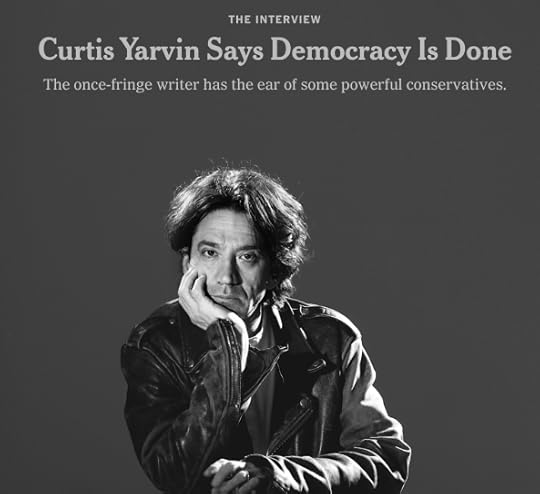
But fear not, The Times‘ Editorial Board is telling leaders, institutions, and us all to stand up to “Trump’s fear tactics.” I share this without comment.

Elsewhere in The Times‘ opinion section, a member of the Editorial Board asks:

She concludes: “I fear that by the time we get around to talking about oligarchy, it will be too late.” And I want to shout: It has been your job to talk about oligarchy and you’re still wondering when you’ll get around to it?
Meanwhile, pity Nick Kristof, who confesses that he has a hard time writing his annual exercise in Pollyannism.

He proceeds nonetheless to mine glimmers of hope, including this:

Except he does not take the next, basic journalistic step, to then point out the state of literacy in America. According to the National Literacy Institute, 79% of U.S. adults are literate and 21% are illiterate in 2024 and 54% of adults have literacy below the sixth-grade level. The U.S. ranks 36th worldwide in literacy. The lack of education in the United States, the attack by the fascist right on the institutions of education, and the ignorance of too much of the public is what made them vulnerable to the siren call of fascism, Fox, and extremist right propaganda.
How can I complain about The Times without complaining about Ross Douthat? He’s optimistic — about Trump!


But if things go sour, Douthat won’t blame the extremist right. He and his new bestie, Yarvin disciple Andreessen, will blame the left for turning them into extremists, as if oligarchic billionaires have no power, no agency even over their own lives and thoughts:
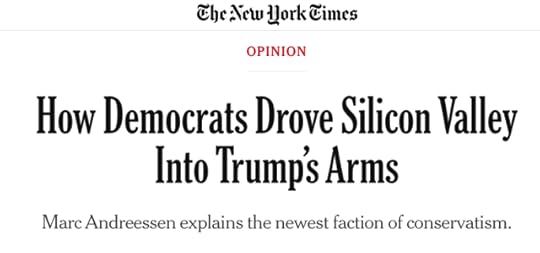
This from a columnist who blames sexual assault on “social liberalism”:
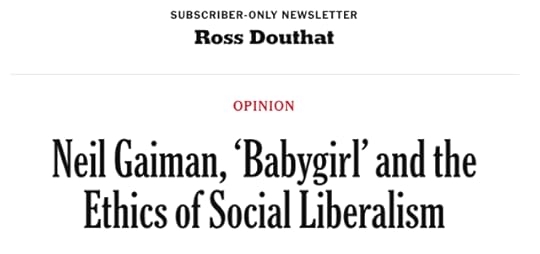
I’m going to end today’s airing of grievances with an odd, final exhibit: Kevin Roose — alongside the Supreme Court, the Congress, and two presidencies — dismissing the freedom of expression of the 170 million Americans on TikTok.

While confessing that he has spent hours enjoying the creativity of the masses there, he shrugs off the app as “a place to waste time, to numb out, to unplug from reality” and “a kind of cognitive surrender,” accusing it (as he has been known to accuse artificial intelligence) of “starting to rewire my brain — blurring my focus, shortening my attention span, making me less interested in media that isn’t laser-targeted to my precise array of dopamine receptors.” It’s sobering how journalists, like oligarchic billionaires, have so little agency.
What’s worse is that he thinks TikTok’s creators and users are shrugging off TikTok on this apparent evidence….
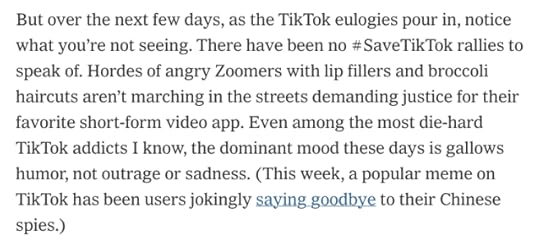
This is such a key illustration of The Times‘ and its journalists’ inability to empathize with the people they are pledged to serve. So let me tell you about my inner thoughts: I’m exhausted and despair at the triumph of ignorance and hatred, at the apparent futility of protest, and at the failure of the field I have devoted fifty years of my life to — journalism — to defend democracy, enlightenment, education, equity, justice, and free speech for all against the titanic forces of totalitarianism and tyranny.
I criticize The Times more than the rest because it had been our best, and the rest — the #BrokenPost especially now — seem well beyond reform. From The Post:

I am at the point of giving up on the incumbent institutions of mass media, in favor of the tender shoots rising from the ashes to replace them, seeds planted by my students. What you see here today in just one paper’s coverage of this terrifying time is how I have come to this.
The post How the #BrokenTimes covers the fascist oligarchy appeared first on BuzzMachine.
November 9, 2024
It’s the racism, stupid

Every current and common explanation for the reelection of Donald Trump — whether inflation or immigration, culture wars or campaign tactics, blaming Harris or Biden or the party — elides its true and root cause: racism.
The United States is a deeply, fundamentally racist nation and unless and until we in white America admit and address that, our endless Civil War will never find peace.
It should be the role of institutional journalism to educate us in this most uncomfortable truth, but it will not, because that is too difficult, controversial, risky, and unprofitable. And first, our media would have to recognize their own role in propagating the myth of American innocence.
But do not listen to me.
Hear Eddie Glaude Jr., who at every on-air opportunity over years instructs white America to face its soul, to recognize that “this is not simply economic populism. This is the ugly underbelly of the country…. This is us. And if we’re going to get past this, we can’t blame it on him.” On Trump. “He’s a manifestation of the ugliness that’s in us.”
Listen to Sherrilyn Ifill’s message now for white America and media:
You are choosing to frame this moment in a way that deflects from the root of the issue. And your role in it…. It is a stunningly reckless & irresponsible step by white voters in this country. THAT’s the story. Not Biden. Not Harris’ campaign (which was excellent). Not Black men. Media, have the guts to follow the story.
Read Elie Mystal’s indictment of us:
We had a chance to create a better world for not just ourselves but our sisters and brothers in at least some of the communities most vulnerable to unchecked white rule, but we did not…. Instead, we chose Trump, JD Vance, and a few white South African billionaires who know a thing or two about instituting apartheid.
See reporting on the horrid threats targeting Black youth in the hours after Trump’s triumph. And see this welcome moment of blunt analysis of racism by The New York Times:
It affirmed the worst of what many Black women believed about their country: that it would rather choose a man who was convicted of 34 felonies, has spewed lies and falsehoods, disparaged women and people of color, and pledged to use the powers of the federal government to punish his political opponents than send a woman of color to the White House.
Or read instead the triumphal Wall Street Journal, Murdoch’s party organ, declaring that diversity, equity, and inclusion are not moral aspirations in society’s self-interest but rather “destructive progressive dogma.” And then simply recall all the horrid and hateful bile openly spewed in Trump’s and Vance’s campaign. They do not hide the racism. They preach it. They proselytize it. Media amplify it.
For Kamala Harris, of course, the sword of equity and justice denied is sharp on two edges: racism and sexism. Misogynoir. She ran a flawless campaign at at impossible moment. The fault is not hers. It is ours: the 10 million who did not show up this time to vote for democracy, the so-called aspirational whites who thought their votes could immunize themselves from MAGA’s bigotry, the white media that failed to raise alarms.
It’s the racism, stupid.
I am ashamed to say how long it has taken me to begin to recognize the extent of the racism in my land and life. My grandparents were bigots, acknowledged and not addressed. I am proud of my parents for breaking free of that upbringing as best they could. They raised me to believe in what I now understand as the myth of the American melting pot: that all would be harmonious once everyone would seem like us — though, of course, we in the white majority would welcome no one else to share our privilege. My generation of white, liberal America was taught we should be blind to color, rather than appreciative of it.
Some years ago, I was involved with an organization that had a considerable problem with racism, and so a trainer was hired to try to get the board, of which I was a member, to see the errors of its ways, which had been revealed most starkly when one member employed that most racist of tropes: race v. excellence.
I remember the trainer instructing us to reflect on our own cultures. I demurred, saying I had none, as my roots were boring and common, raised in a suburban sitcom family minus the punch lines: Miracle Whip on Wonder Bread. Then I heard myself. I had been challenged to recognize the dominance of my culture, how blind I had been to people of every other culture code-switching to make me comfortable, abandoning their identities to seek a place in the echelon of society that still would deny them. That is my whiteness. That is why Professor Glaude urges white Americans to finally “embrace a history that might set them free from being white.”
This is why it is so horribly wrong to hear the likes of Chris Matthews smugly declare on Morning Joe that identity politics is dead because identity politics are to blame for Harris’ loss. Can he not hear himself? The election of Trump is the product of identity politics: white identity politics, dismissing, disdaining, and threatening people of every other identity.
I have spent my last decade studying the history of mass media and the idea of the mass as a means of depriving the majority of people of their identities. In my research, I have read and learned from scholars including Drs. Glaude; André Brock Jr. from his book, Distributed Blackness; Charlton McIlwain from his, Black Software; and Meredith Clark from her scholarship on Black Twitter. Their work helped me frame my theory about the internet’s role in our current upheaval.
No, I am not going to blame the internet for an ill-informed public; responsibility for that failing must land first at the door of news media. Instead, I credit the internet with at last providing a place at the table of public discourse for those too long ignored and excluded by so-called “mainstream” (that is to say, white) mass media. Those who controlled discourse in media and politics resent this intrusion on their monopoly of power, privilege, and attention.
Thus, as I’ve theorized here and in my books, what Martin Luther was to the technology of print, #BlackLivesMatter may be to the technology of the internet: a racial Reformation, with the election of Trump as counter Reformation. The question before us is whether we, too, will now enter our Thirty Years’ War — or continue our Civil War — or find some way to end it.
Black America — Black voters — once again did their best to save the nation, but they cannot raise us up when we in white America block the road to the mountaintop. They cannot rescue us from ourselves and cannot be expected to continue trying.
The only way we will ever escape this cycle of fear, hate, and exploitation is through education. Schools are our salvation; the data make that clear.
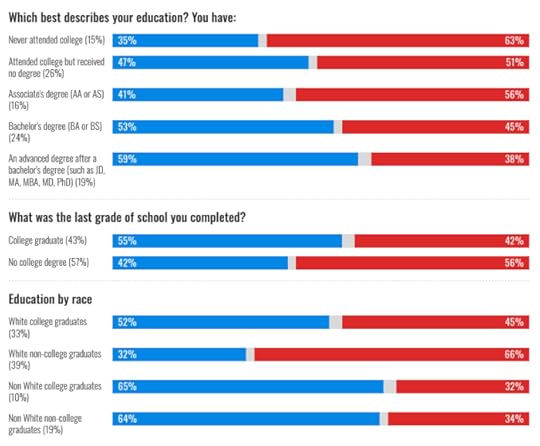
So it is no surprise that American fascism attacks the institution of education to abort the Enlightenment of future generations. One of the most sobering realizations of this election is how we are raising a next generation of isolated, angry, uneducated white boys glibly and offensively branded the “manosphere.”
Failing education, our other recourse with adults should be our media, both entertainment and news. But Hollywood is less a leader and more an exploiter of culture, afraid to be woke, to offend and lose customers as it still chases the dead idea of the mass.
And journalism? Its mission should be to confront the powerful — by that, I do not mean just politicians and moguls but all of white America — with the most discomfiting of truths about our shared racism. Yet newsrooms still exclude those who could report and edit that story — so much so that the newspaper industry has given up even counting people of color inside. White media cannot get to the starting line of acknowledging how white media are.
I have no suggestions other than to listen to, learn from, amplify, and respect those who know better because of how they experience our nation.
Do not listen to me. I am merely a student.
Do not listen to the pundits who resort to their favorite, pat explanations: It’s the economy, stupid. No, stupid, it’s nothing so simple. And by the way, we have not begun to imagine economic anxiety until we see the effects of Trump’s tariffs, mass deportation, destroyed social net, inflation, debt, and mogul welfare to protect those at the top and none below.
Do not listen, either, to the pollsters who are so chronically wrong, who subvert public discourse and paper over nuance with their own easy answers, prefabricated for the public. When people are asked whether they’re upset over high prices, you know they’re going to say they are. They’re not going to say they are fearful of Black people with accents moving into their towns, for racism is not one of the choices they’re given. Polls do not present the truth of the nation; they attempt to veil it.
Do not listen to the commentators who want to blame Biden for not leaving sooner or blame Harris for not distancing herself from him or blame them both for not fulfilling the promises Republicans blocked.
Listen instead to Professor Glaude, who as I wrote this said from his lectern of the air: “It’s not about what Kamala Harris didn’t do. It’s about who we are.”
Then listen once more to Professor Ifill:
The fact that the leading opinion columnists in this country have chosen to frame the question of the moment in terms of a wellness check on “the Democrats” rather than on the country speaks to inadequacy the punditry has demonstrated. This election was a referendum on AMERICA — not on the Democrats. On our national identity and values. On the fitness of this country for global, moral, economic, scientific, and ideological leadership. Where does this leave America? THAT is the question.
The post It’s the racism, stupid appeared first on BuzzMachine.
November 6, 2024
How Fucked Are We? Very.

Nevermind every other theory or tactical complaint about what happened in this election. Kamala Harris did everything she possibly could to win. The fault is not hers.
The fault is in our nation. We must come to the realization that America is deeply racist and sexist, incapable of electing a Black, Asian woman to its highest office because of our culture’s innate, widespread, and unreconciled bias and hatred. That is the root of it. That is the weed that will now grow unkempt no matter how much media wish to groom the nation to make us look as if it were not so. Its aims of oppression will grow daily.
Women will lose control over their bodies, their health, their lives.
Black Americans know better than anyone, of course, how racist America is. Now there will be no limits to it; this election gives it permission.
LGBTQ+ people may be deprived every precious right they fought so bravely to attain as bigots try to force them back into closets.
Some portion of Latino voters may think — like Italians long before them, who once were considered people of color and then were not — that they might buy their way into favor with white America with their votes. But note well that even today, Italian-Americans are a protected class at CUNY; discrimination never ends. No matter their contribution to Trump’s victory, some citizens will again be called garbage by those in power.
Immigrants, whether documented or not and citizens or not, will find their families and lives torn apart as Trump follows through on his promise of mass deportation, tearing husbands, wives, parents, and children from each other on the suspicion brought by an accent, a name, the color of skin.
Every consumer will suffer higher prices — no matter what their yard signs promised — as Trump undertakes his deportations and tariffs. They admit the economy will be in shambles.
God save the people of Ukraine, who will face defeat as Trump gives his Putin anything he wants, and the people of Gaza, with Netanyahu completely unconstrained by his friend Trump. NATO, South Korea, Taiwan, and the beneficiaries of American generosity, support, and diplomacy are all at risk.
Trump’s political opponents and whistleblowers will suffer in ways he is only beginning to imagine.
Justice will suffer as Trump and his Senate can now stack every federal court with young extremists for generations to come, allowing them to tear down the institution of the Constitution under the guise of interpreting it with convenient pedantry to support their absolute power. The institutions of voting rights, fair elections, and equal rights under the law will diminish further.
Every institution will be attacked, for that is the goal of this brand of so-called conservatism: not to conserve institutions but to destroy them, rather than share their benefits with those who follow.
Elon Musk will do Trump’s bidding, outlawing the institution of the civil service, replacing it again with political patronage.
RFK Jr. will drive Trump to outlaw vaccinations, essentially outlawing the institutions of medicine and science.
Education is under constant attack from the right. What DeSantis has done to universities in Florida will no doubt provide a model for the destruction of the university and its institutions: academic freedom, faculty governance, tenure, pure research, the humanities.
The institution of free speech will be very much at risk, even as Trump, Musk, and their supposedly contrarian lock-step thinkers argue they are its protectors. They will forbid and harass speech of which they do not approve.
The institution of journalism will suffer, as it is likely that more journalists will be harrassed, even sued or jailed by Trump and his thugs. Mogul publishers will think themselves vindicated for obeying in advance and continue to squash controversy unpopular with power. Journalists — some of them — will let themselves be carried along with the right wing, declaring it the will of the people. Just this morning, I heard one guest commentator on MSNBC say that identity politics is dead and that Democrats will have to abandon progressivism to win — which is like saying that Democrats must commit suicide to live.
Journalists and media executives refuse to acknowledge their key role in sane-washing dangerous insanity, soft-pedaling fascism, enabling amnesia and historical ignorance in the populous they serve. These journalists will get angry with the liberals who are angry at them. Their incumbent institutions — Trump bump: the sequel or not — will decline and they will have the gall to wonder why.
What is to be done? That is the question I am hearing from friends and family. No one has an answer.
In my books, I theorize that what the most important thing the internet has done is give people who were not represented, heard, or served in so-called mainstream mass media their stage at long last — and that is what those who controlled the stage resent and resist. Thus I wonder whether the Reformation of this era of technological change will turn out to be the racial Reformation of #BlackLivesMatter, and the January 6 attack on the Capital and Trump’s triumph its counter Reformation.
Where will this end? Print and Luther’s reformation led to peasants’ wars of exactly five hundred years ago and the Thirty Years’ that followed. Must we find ourselves in such open struggle to reach a conclusion or at least a truce?
I write this while on an ill-timed trip to Germany to give a talk, wishing I were not away from home right now as everyone I know and love is in pain. But being here, I wonder whether American fascism will have to find its denouement as it did here in Europe, in vast tragedy and destruction, before sanity might return.
This election was my hope that we could find a different way, to rebuild not from the ashes but from where we stood. Now I am not sure. What is ultimately broken is not the set of institutions the extremists are trying to destroy but instead our nation itself. Until we face its faults of racism, sexism, and inequity we will never be finished fighting our war, our endless Civil War.
The post How Fucked Are We? Very. appeared first on BuzzMachine.
October 17, 2024
The technology addiction trope
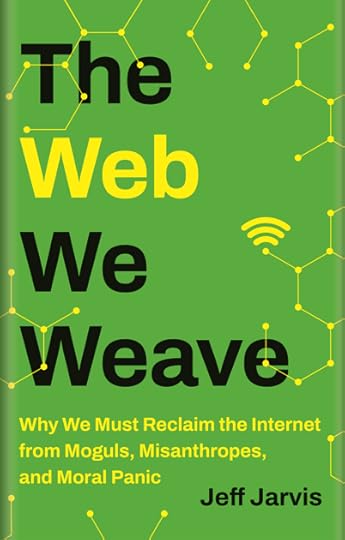
Rupert Murdoch’s media have been a key source of moral panic about the internet and technology — see, for example, this from his Times declaring that phones are “dope” that imprison us all in an epidemic of addiction causing cognitive decline:
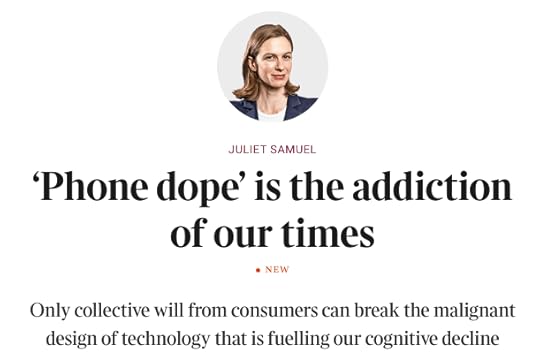
On the latest episode of This Week in Google, we discussed parents’ legitimate concerns about their children’s technology use as they seek help in monitoring and managing it, as cohost Paris Martineau explores in her excellent reporting. I challenge the assumption of addiction in framing the discussion and read bit from my new book, The Web We Weave, so I thought I’d share the rest, in which I look at the source of the addiction argument regarding the internet and now phones:
In July 1996 — only two years after the introduction of the Netscape web browser — Columbia University psychiatry professor Ivan Goldberg posted a notice to an online bulletin board he founded, intending to parody the language of the Diagnostic and Statistical Manual of Mental Disorders (DSM), the profession’s encyclopedia of mental disorders. Goldberg announced criteria for a new diagnosis: internet addiction. The astute might have noticed the word “humor” in the announcement’s URL or the odd symptoms listed: “voluntary or involuntary typing movements of the fingers.” Even so, folks appeared on the bulletin board, claiming they suffered the ailment he had just concocted, so he kept the joke going by creating the Internet Addiction Support Group, even though he believed that “support groups for internet addiction made about as much sense as support groups for coughing.”
Goldberg regretted the coinage of internet addiction disorder. “I.A.D. is a very unfortunate term,” he told The New Yorker. “It makes it sound as if one were dealing with heroin, a truly addicting substance that can alter almost every cell in the body. To medicalize every behavior by putting it into psychiatric nomenclature is ridiculous. If you expand the concept of addiction to include everything people can overdo, then you must talk about people being addicted to books, addicted to jogging, addicted to other people.”
Kimberly Young founded the Center for Internet Addiction and in 1996 presented a paper to the American Psychological Association declaring “the emergence of a new clinical disorder: internet addiction.” Mind you, = Google didn’t come along until two years later in 1998, Facebook until 2004, YouTube in 2005, and Twitter in 2006. She declared that folks had become addicted to the crude, slow, ugly — and expensive — early web. Young modeled her definition of internet addiction on pathological gambling and created questionnaires to measure the affliction’s severity: “How often do you find you stay online longer than you intended? . . . How often do you neglect household chores to spend more time online? . . . How often do you form new relationships with fellow online users? . . . How often do you snap, yell, or act annoyed if someone bothers you while you are online? . . . How often do you fear that life without the internet would be boring, empty, and joyless?” How would any of us answer those questions — about the internet or a binge-worthy TV show or good book?
Young advertised for volunteers for her first study from Goldberg’s parody Internet Addiction Support Group as well as a Webaholics Support Group — hardly representative populations. On that basis she
declared the condition serious, with 98 percent of people reporting moderate or severe impairment in work and relationships. She layered the report with anecdata: “Dependents gradually spent less time with real people in their lives in exchange for solitary time in front of a computer.” Thirty-five percent of her dependent subjects said they spent time in chat rooms, 28 percent in multiuser games, 15 percent in news discussion groups, and 13 percent in email — all of which entails interacting with people I would classify as real. “Initially,” Young continued, “Dependents [her capitalization] tended to use the Internet as an excuse to avoid needed but reluctantly performed daily chores. . . . For example, one mother forgot such things as to pick up her children from school, to make them dinner, and to put them to bed because she became so absorbed in her Internet use.” I cannot help but be reminded of a critic writing of novels in 1795: “My sight is every-where offended by these foolish, yet dangerous, books. I have actually seen mothers, in miserable garrets, crying for the imaginary distress of an heroine, while their children were crying for bread.”
Young was not alone in sounding the alarm. Psychology Today declared in 1998, “Internet users who become addicted to online activity usually face divorce, unemployment, financial and legal difficulties and child neglect.” Usually? The magazine said unnamed experts estimated that for as many as five million Americans, “the Internet has become a destructive force.” Only two years later, in 2000, Psychology Today upped the ante to estimate that 25 million Americans “qualify as compulsive surfers.” At least the magazine exercised sufficient self-awareness to note, “Today, so-called addictions are everywhere: sex, exercise, work, chocolate, TV, shopping, and now the Internet. Have we been, well, abusing the word?”
Young founded the first inpatient hospital clinic for internet addiction in Pittsburgh. Others followed. In 2009, two therapists founded reSTART atop “Serenity Mountain,” twenty-five miles from Microsoft’s headquarters in Washington, to treat teens and young adults for a long list of alleged ailments associated with the net: screen dependence (now including virtual reality), internet gaming disorder, gambling, compulsive shopping, social-media use, and intimacy disorder. The program costs a reported $18,000 to $20,000 per month. Inpatient programs run two to twelve months, then reSTART offers off-campus living in “tech-limited” apartments, for six to twenty-four months, followed by ongoing coaching. I do not diminish the painful reality of compulsive behavior around any activity and its connection to co-occurring conditions, including depression, anxiety, ADD/ADHD, and personality disorders. Often internet use is a symptom of other issues — and sometimes a salve for them, a way to grapple with concerns we all can share, like loneliness. If there is an internet pathology, how prevalent might it be? We do not know, for there is as yet no agreement even on definitions, in spite of almost five thousand papers on “internet addiction” appearing on the National Institute of Health’s database.
Mark Griffiths wrote the first academic paper examining the idea of internet addiction, in 1996. He questioned Young’s research: “It is unlikely that very many of her dependent Internet users was a bona fide Internet addict.” Writing in 2003, he noted that “the Internet can be used to counteract other deficiencies in the person’s life (e.g. relationships, lack of friends, physical appearance, disability, coping, etc.)” and that “text-based relationship can obviously be rewarding for some people.” In another paper, he proposed that “many of these excessive users are not ‘Internet addicts’ but just use the Internet excessively as a medium to fuel other addictions.”
Griffiths’ observation speaks to much controversy about the net: it is blamed as the cause of many ills when often it is merely a conduit for them. I emailed Griffiths and asked whether his opinion had changed in the intervening decades of research. He replied with a paper that expressed his current view: “There are also much wider problems with the use of the term ‘internet addiction’: though the number of studies in the field of internet addiction has certainly grown, most have really investigated addictions on the internet rather than to the internet. . . . In short, the overwhelming majority of so-called internet addicts are no more addicted to the internet than alcoholics are addicted to the actual bottle.”
Not infrequently, writers call on biology to back up their claims of addiction, reporting that smartphones and their apps induce the production of dopamine, as drugs do. “Digital addictions are drowning us in dopamine,” claims a headline in The Wall Street Journal over a Stanford psychiatrist’s contention that the smartphone is “the equivalent of the hypodermic needle for a wired generation.” In The Washington Post, Fareed Zakaria decides that TikTok is “dangerously addictive” and must be regulated because it delivers dopamine. Except as Stetson University psychology professor Christopher Ferguson points out, “Anything fun results in an increased dopamine release in the ‘pleasure circuits’ of the brain — whether it’s going for a swim, reading a good book, having a good conversation, eating or having sex. Technology use causes dopamine release similar to other normal, fun activities: about 50 to 100 percent above normal levels.” That is versus cocaine, which increases it 350 percent, and methamphetamine, 1,200 percent. Says Ferguson, “Technology is not a drug.”
Nevertheless, journalists continue to insinuate that we are wired addicts. Forbes: “Digital Addiction: Should You Be Worried?” The BBC: “Is Internet Addiction a Growing Problem?” CNN: “How Much Screen Time Is Too Much?” They pose these headlines as questions because they don’t have the facts to back up their allegations. Let us note the irony of journalists crying addiction: news organizations themselves are dying to addict us. As with so many of the press’ charges against the net, it is that press that invented and perfected the crime.
The post The technology addiction trope appeared first on BuzzMachine.
Jeff Jarvis's Blog
- Jeff Jarvis's profile
- 133 followers



